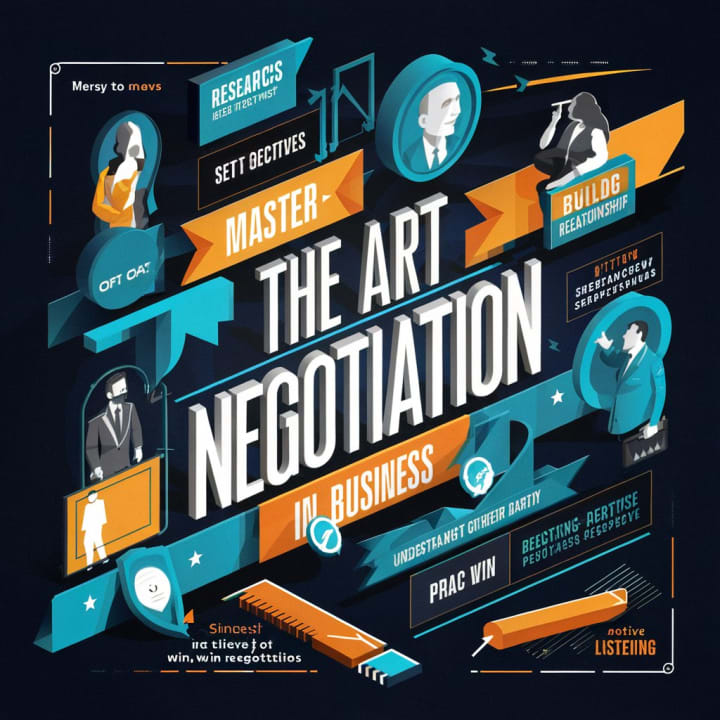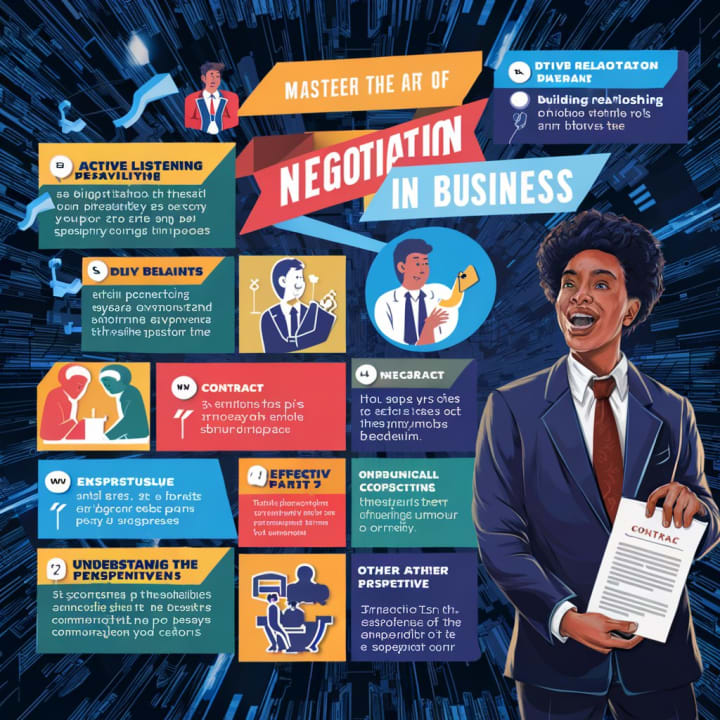How to Master the Art of Negotiation in Business
Win Deals and Build Strong Professional Relationships

Negotiation is a critical skill in the world of business. Whether you are closing a deal, securing a contract, or resolving a conflict, mastering the art of negotiation can significantly impact your success and your ability to build strong professional relationships.
This comprehensive guide will explore key strategies and techniques for effective negotiation, providing you with the tools to win deals and foster long-term business partnerships.
Understanding the Importance of Negotiation
Negotiation is more than just a discussion between two parties. It is a strategic conversation that aims to reach a mutually beneficial agreement. Effective negotiation skills can lead to better deals, stronger relationships, and increased confidence in your business interactions.
**Key Benefits of Mastering Negotiation:**
- Improved Deal Outcomes: Achieve favorable terms and conditions that align with your business goals.
- Enhanced Relationships: Build trust and rapport with clients, partners, and colleagues.
- Conflict Resolution: Address and resolve disputes amicably and efficiently.
- Increased Confidence: Approach negotiations with assurance and poise.

Preparing for Negotiation
Preparation is the foundation of successful negotiation. The more you know about the subject, the other party, and your own goals, the better equipped you will be to negotiate effectively.
1. Know Your Objectives
Before entering any negotiation, clearly define your objectives. What do you hope to achieve? Identify your primary goals and any secondary goals that you may be willing to compromise on. Understanding your objectives will help you stay focused and avoid making concessions that do not align with your overall strategy.
2. Research the Other Party
Gather as much information as possible about the other party. This includes their needs, preferences, business practices, and negotiation style. Knowing the other party’s priorities and constraints can help you tailor your approach and find common ground.
3. Determine Your BATNA
BATNA stands for "Best Alternative to a Negotiated Agreement." It represents your fallback plan if the negotiation does not result in a deal. Knowing your BATNA gives you leverage and prevents you from accepting unfavorable terms out of desperation.
4. Set Your Limits
Establish your walk-away point – the minimum terms you are willing to accept. Having clear limits will prevent you from making unnecessary concessions and help you maintain your negotiating power.

Key Negotiation Strategies
Effective negotiation involves a combination of strategies and techniques. Here are some essential strategies to consider:
1. Build Rapport
Building rapport with the other party can create a positive and collaborative atmosphere. Start with small talk to establish a connection, show genuine interest in their needs, and find common ground. Building rapport can lead to a more open and productive negotiation process.
2. Active Listening
Active listening is crucial in negotiation. Pay close attention to the other party’s words, tone, and body language. Show empathy and understanding by acknowledging their concerns and repeating back key points. Active listening demonstrates respect and can help uncover valuable information.
3. Ask Open-Ended Questions
Open-ended questions encourage the other party to share more information and provide insights into their priorities and motivations. Use questions that start with "what," "how," or "why" to facilitate a deeper conversation.
Examples:
- "What are your main priorities in this deal?"
- "How do you see us working together in the long term?"
- "Why is this particular term important to you?"
4. Use Silence Effectively
Silence can be a powerful tool in negotiation. After making an offer or asking a question, pause and wait for the other party to respond. Silence can create pressure and prompt the other party to reveal more information or make concessions.

5. Focus on Interests, Not Positions
Negotiations can become contentious when parties focus solely on their positions (what they want). Instead, focus on underlying interests (why they want it). By understanding the other party’s interests, you can find creative solutions that satisfy both sides.
6. Be Willing to Compromise
Successful negotiation often involves compromise. Be prepared to make concessions on less critical points to achieve your primary goals. Identify areas where you have flexibility and use them to build goodwill and reach a mutually beneficial agreement.
Effective Communication Techniques
Clear and persuasive communication is essential in negotiation. Here are some techniques to enhance your communication skills:
1. Use Positive Language
Positive language creates a collaborative atmosphere and shows your willingness to find a solution. Avoid negative or confrontational language that can escalate tensions.
Examples:
- Instead of saying, "We can’t accept these terms," say, "We’re looking for terms that align more closely with our goals."
- Instead of saying, "You’re wrong," say, "I see it differently. Here’s my perspective."
2. Stay Calm and Composed
Emotions can run high during negotiations, but staying calm and composed is crucial. Take deep breaths, pause before responding, and maintain a professional demeanor. Emotional outbursts can undermine your credibility and weaken your negotiating position.

3. Use “I” Statements
“I” statements express your perspective without blaming or criticizing the other party. They help communicate your needs and concerns in a non-confrontational manner.
Examples:
- "I feel concerned about the timeline for this project."
- "I need more information to make an informed decision."
4. Clarify and Summarize
Clarify any ambiguous points and summarize key takeaways to ensure mutual understanding. This prevents misunderstandings and ensures that both parties are on the same page.
Example:
- "Just to clarify, you’re looking for a delivery date of September 1st, correct?"
- "To summarize, we’ve agreed on a 10% discount for bulk orders."
Handling Difficult Negotiations
Not all negotiations go smoothly. Here are strategies to handle difficult situations:
1. Stay Focused on Solutions
When faced with obstacles, focus on finding solutions rather than dwelling on problems. Encourage brainstorming and explore alternative options that can meet both parties’ needs.
2. Address Conflicts Directly
If conflicts arise, address them directly and professionally. Acknowledge the issue, express your concerns, and work together to find a resolution. Avoid personal attacks or blame.
Example:
- "I understand there’s a disagreement on pricing. Let’s discuss how we can find a middle ground."

3. Know When to Walk Away
Sometimes, walking away is the best option. If the other party is unreasonable, uncooperative, or unwilling to meet your minimum terms, be prepared to walk away. Knowing your BATNA gives you the confidence to make this decision when necessary.
Building Long-Term Relationships
Negotiation is not just about winning deals; it’s also about building long-term relationships. Here’s how to foster lasting professional relationships:
1. Deliver on Promises
Keep your commitments and deliver on promises made during negotiations. Reliability and consistency build trust and credibility.
2. Show Appreciation
Express gratitude and appreciation for the other party’s cooperation and efforts. A simple thank-you can go a long way in maintaining positive relationships.
3. Stay in Touch
Maintain regular communication with your business partners and clients. Check in periodically, provide updates, and look for opportunities to collaborate in the future.
4. Seek Feedback
Ask for feedback on the negotiation process and your performance. Constructive feedback can help you improve your skills and demonstrate your commitment to continuous improvement.

Continuous Improvement
Mastering negotiation is an ongoing process. Here are some ways to continuously improve your negotiation skills:
1. Reflect on Past Negotiations
After each negotiation, take time to reflect on what went well and what could be improved. Identify lessons learned and apply them to future negotiations.
2. Learn from Others
Observe skilled negotiators and learn from their techniques. Seek mentorship from experienced colleagues or attend workshops and seminars on negotiation.
3. Practice Regularly
Like any skill, negotiation requires practice. Look for opportunities to negotiate in various contexts, both professionally and personally. The more you practice, the more confident and effective you will become.
4. Stay Informed
Stay informed about industry trends, market conditions, and best practices in negotiation. Keeping up-to-date with relevant information enhances your credibility and bargaining power.

Conclusion
Mastering the art of negotiation in business is essential for achieving favorable outcomes, building strong professional relationships, and advancing your career.
By preparing thoroughly, employing effective strategies, and continuously improving your skills, you can become a more confident and successful negotiator. Remember that negotiation is not just about winning deals but also about fostering long-term partnerships and creating value for all parties involved.
#NegotiationSkills, #BusinessNegotiation, #EffectiveCommunication, #ProfessionalRelationships, #DealMaking, #NegotiationTechniques, #WinWinNegotiation, #ConflictResolution, #BusinessSuccess, #NegotiationStrategy, #LeadershipSkills, #CareerDevelopment, #BusinessGrowth
About the Creator
Sherif Saad
Hey there, fellow word enthusiasts! I'm Sherif, and I'm thrilled to embark on this creative journey with you
I'm a passionate writer with a love for storytelling that knows no bounds diving into the world of words.
Enjoyed the story? Support the Creator.
Subscribe for free to receive all their stories in your feed. You could also pledge your support or give them a one-off tip, letting them know you appreciate their work.






Comments
There are no comments for this story
Be the first to respond and start the conversation.